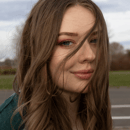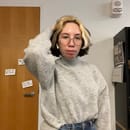In honor of October being “Coming Out” month, the LGBTQIA+ members of Her Campus sat down virtually over Zoom to have a round table discussion about figuring out our sexuality, our first relationships, our current feelings, and bonding with other members of the community. Read on to find out about our experiences and what we learned!
“Alice”
My experiences with sexuality are what I’d call muted compared to everyone else’s. As someone who actively avoids relationships despite being bisexual, and proud of that fact, I don’t have much experience to shape my understanding. For a long time, I had thoroughly convinced myself that I was asexual in an attempt to make myself feel better about my decision to avoid dating, but the epiphany came in one of the most stereotypical college places: a bar. I remember standing curled up in the corner of the bar while my friends danced around me frantically texting my childhood best friend and my sister about the internal debate that basically boiled down to “damn girls are hot.” They broke the news easy to me, considering I was a little drunk, and then there was no going back. Even with this weight lifted off my shoulders, it hasn’t been smooth sailing. First, I’m probably going to have to go through some therapy to understand what terrifies me about relationships. Second, my mother was once voted most likely to become a nun. This isn’t to say that she’s entirely close-minded, just that I’ve spent hours upon hours trying to get her to care about people who aren’t white heterosexuals and I’m not ready to throw myself to the flames just yet. It’s to the point that my Tinder, set up by the loving mother who doesn’t understand why I’m alone, is only set to guys. Something I’ve discovered throughout my time in college is that even when I wasn’t sure about my sexuality, almost everyone I met was in some way shape or form part of the community. It was an eye-opening and welcoming experience that provided the opportunity to see what each aspect of the spectrum consisted of through a close friend living it. I’m not ashamed of being bisexual, just in limbo.
“Bri”
Hi, I identify as gay! My coming out has been met with kindness and acceptance by everyone I’ve come out to. I’ve always known I liked girls but didn’t have the vocabulary to label it until I was in fourth grade. I grew up in a small town and there was little to no LGBT representation in my life. I have a very kind and accepting family, even though LGBT topics were not discussed; my parents were welcoming to everyone and taught me to be the same. I told myself I didn’t feel the need to come out in high school because I wasn’t looking for a relationship and was busy with sports, friends, and schoolwork. In reality, I was afraid of what people would think of me or what they’d say behind my back. I didn’t want everyones’ perception of me to be altered just because they found out I was gay. When I got to college, I met more people who identified as LGBT than I ever could have imagined. I figured there was no use in hiding who I was or only giving people half of my real self because if someone doesn’t accept me for being gay, then I don’t need them in my life. My teammates were the first people I came out to my sophomore year of college and they were all okay with it. After that, I slowly started coming out to people and now I am openly gay to just about anyone who knows me. Being gay has given me a strong sense of community and it is a part of me that I love.
“Lily”
I’ve really never been afraid to talk about sexuality before, but I’ve also never been one to label myself. For a while I identified as “Bisexual” because it seemed to be accurate enough for me at the time. In recent years, I’ve kind of pulled the label back and decided that I don’t need to be a specific sexuality. I’m someone who just wants to be themselves and not put labels on every aspect of my life. I’ve never hidden the fact that I’m not entirely straight. It’s just not something I feel the need to tell everyone in my life. My family has never been judgemental about the LGBTQ+ community, but I still don’t feel the need or urge to formally come out to them. Who I’m sexually attracted to is, frankly, none of their business. I know who I like and that’s all that matters. If someone ever asks me what my sexuality is, I usually just say “not straight.” Although I’ve never been in a relationship, I know what I’m attracted to, and gender is usually not the thing I use to determine if I like someone or not. There hasn’t been a label that fits my feelings perfectly, so I just prefer not to assign a label. I’m me and that’s it. No tags required.
Mattie
To me, being bisexual means being myself. When I finally came out, I felt like I finally understood who I was. I was free to like who I wanted and free to be who I wanted. I was also very fortunate. My friends readily accepted me for who I am; being bi didn’t change how they saw me, and I’ll be forever grateful for that. If I were to give advice to anyone who is struggling to come out, I would say not to rush it. Do it when you feel the most comfortable and sure of yourself. I know it can be hard coming out, but just know there’s always going to be a community out there that will love and support you no matter what. For me, that community was my friends. For you, it could be anyone: your family, your friends, your college roommate, even a school counselor. Find that person who makes you feel happy to be yourself and hold onto them.
Shannon
My experience with being bisexual has been a bit of a rollercoaster. I came out when I was 14, but went back into the closet shortly after, and honestly didn’t really like coming out at all. For a long time, I knew something was up. As a child, my feelings for girls were confusing to me, cause I often got extremely attached to a girl in my class or even sometimes TV/movie characters and didn’t understand why I felt the way I did. Looking back, I can recognize it as attraction, but there was basically no representation for queer women in the media that wasn’t negative. I didn’t even know what bisexuality was until I was maybe 13. I grew up with conservative parents who didn’t necessarily approve or understand LGBT+ people or issues, and it discouraged me for a long time from exploring at all. I had to more or less break myself out of thinking like they did as I re-educated myself through the internet. Dating as a bi woman has also been super complicated — women seem to never be able to be clear about what they actually want with me (friendship or a hookup), and then men usually seem to just want to hookup and never pursue a relationship. It can be frustrating to also feel like, if I date a woman, I will be seen and referred to as a lesbian, yet if I date a man, I will be seen and referred to as straight — to which neither is true! Not that either of those identities are bad, they just aren’t me. While I understand that people obviously make assumptions because that’s how our brains are hardwired for survival, it can be incredibly invalidating to know that there is not a whole lot of visibility to your sexuality still in 2020. Something I really enjoyed about the roundtable was the sense of community between all of the women who showed up. I felt as though many of them had similar experiences and we all really understood each other and could relate to our experiences. That is validating in and of itself. Also, gay people are just funnier and have more fun — in my humble opinion. I love being bi and wouldn’t change anything about myself at the end of the day.
Tess
I think coming out as lesbian had kind of been something that was bound to happen for me, but because of internalized homophobia, I just pushed it to the side until I literally had to face it. Once quarantine started and I got broken up with, there was just a ton of time to think and reflect, just generally working on myself until I figured out what felt right. It was something that took literal years to figure out, but once I did, something fell into place. I’ve become way more comfortable with embracing who I am, and I’m not really afraid to admit who I am to anyone. There are still a lot of people I’m not out to, and that’s because I’m honestly still coming to terms with who I am and who I love. It’s a lot easier to understand now, though, that it’s more than okay to only like women. It’s something that doesn’t define me, but is also something that doesn’t have to be nudged back into the shadows. I don’t have to be ashamed of liking women, nor do I have to hide it from myself anymore. The general comfort of coming out and having friends who support me is a feeling I would take any day over the trapped feeling I had from sixth grade until this year. I’m super proud of who I am currently, and I wouldn’t change who I am for anything!
“Violet”
Being asexual has been a difficult realization because the world is full of people who want to have sex. And talk about sex. And think about sex. The media is filled with things about sex. And it’s kind of difficult to come to terms with realizing that you are just not sexually attracted to anyone at all. That led to me wondering if I was maybe lost as to who I was attracted to. I couldn’t tell if I was attracted to men or women. After a bit of soul searching, I realized that I was attracted to men but the fear of being rejected by anyone I was interested in was terrifying because I did not want my s/o to leave me because I could not/would not have sex with them. I did eventually end up having sex, at the ripe age of 22, and it made me realize that the act of sex itself was not scary. I realized that while I do not feel any kind of sexual attraction towards my partners, if I wanted to, I could still have sex with them. It changed the way I saw myself and my body. I became more open and I do enjoy sex but I do not get turned on and I am not sexually attracted to anyone still. And I know it’s not because I haven’t “found the right person.” I’ve become more open when talking to my partners and explaining how I feel and what is happening so that way there is always an open line of communication. Thankfully, except once, I haven’t had to deal with someone telling me that I wasn’t asexual. Finding other asexual friends also helped!




